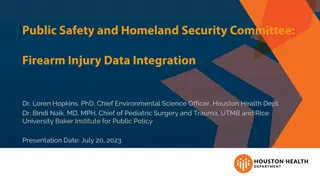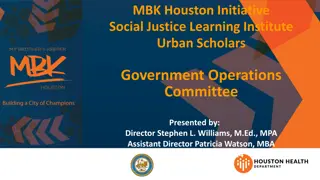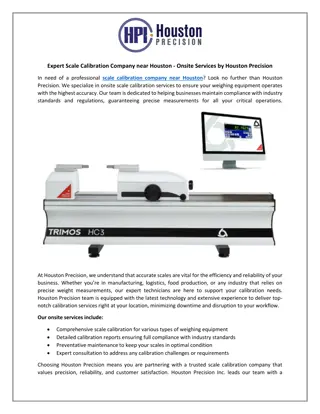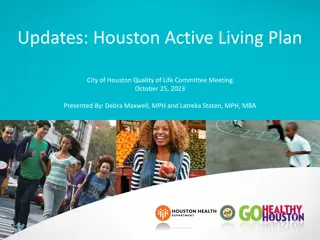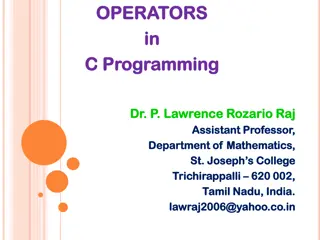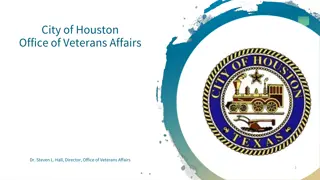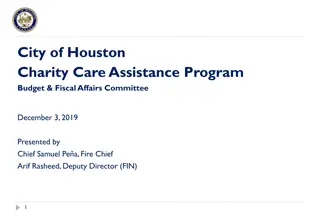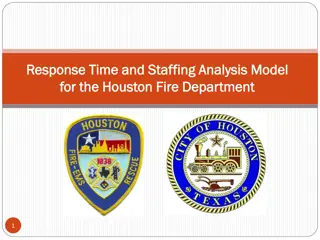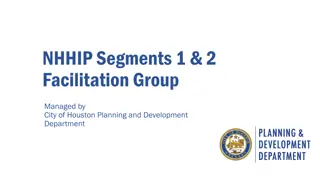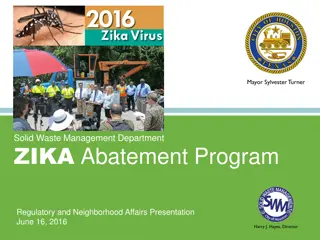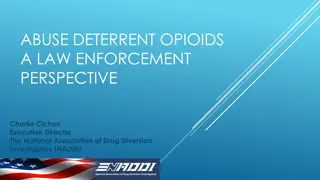Houston Narcotics Division Overview and HIDTA Initiative
The Houston Police Department's Narcotics Division is tasked with combatting illegal possession, manufacture, and distribution of controlled substances. The division includes specialized investigative squads such as General Narcotics Enforcement, Houston Intelligence Service Center, Major Drug Squad, and more. Additionally, the High Intensity Drug Trafficking Areas (HIDTA) program, created by Congress, assists law enforcement agencies in critical drug-trafficking regions. The program aims to reduce drug trafficking through enhanced cooperation and intelligence sharing.
Download Presentation

Please find below an Image/Link to download the presentation.
The content on the website is provided AS IS for your information and personal use only. It may not be sold, licensed, or shared on other websites without obtaining consent from the author. Download presentation by click this link. If you encounter any issues during the download, it is possible that the publisher has removed the file from their server.
E N D
Presentation Transcript
HPD Narcotics Division Overview CHIEF ART ACEVEDO EXECUTIVE ASSISTANT CHIEF MATT SLINKARD ASSISTANT CHIEF JIM JONES MARCH 21, 2019
Division Overview The Narcotics Division is charged with the suppression of illegal possession, manufacture, and distribution of controlled substances. A number of specialized investigative squads exist to respond to the complexity of tasks that narcotics officers must complete often times in conjunction with other agencies. These squads include: General Narcotics Enforcement; the multi-jurisdictional Houston Intelligence Service Center (HISC); the Major Drug Squad (MDS); the Forfeiture Abatement Support Team (FAST); Targeted Narcotics Enforcement Team (TNET); the Houston Money Laundering Initiative (HMLI); the Truck, Air, Rail and Port Task Force (TARP); the Pharmaceutical Diversion Squad (PILL); the Narcotics Operations Control Center (NOCC); (now located at the JPC) the Heroin Squad; and the Canine Detection Squad.
Organizational Chart Commander Senior Office Assistant . Truck, Air, Rail, Port & Pharmaceutical Squad & Major Drug Squad Special Projects & Houston Investigative Support Center Administrative & Internal Affairs Unit Gen. Narcotics North Enforcement Gen. Narcotics South Enforcement Houston Money Laundering Initative Targeted Narcotics Enforcement Team Internal Affairs Squad 9 Squad 14 Gen. Forcement Squad 4 TARP Squad 16 HMLI-1 Squad 18 TNET-1 Squad 22 HISC Gen. Enforcement Squad 23 Technical Surveillance Unit Squad 1 Administrative Squad 10 Gen. Enforcement Squad 15 Gen. Enforcement Squad 5 Motel/Motel Squad 17 HMLI-2 Squad 20 TNET-2 Squad 2 Asset Forfeiture Squad 6 TARP Squad 21 Heroin Squad Squad 24 FAST Canine Admin Squad 3 Training Unit & Computer Ops. Squad 25 NOCC Squad 7 Major DrugSquad Squad 19 Pharmaceutical Squad
Houston HIDTA Initiative The High Intensity Drug Trafficking Areas (HIDTA) program, created by Congress with the Anti-Drug Abuse Act of 1988, provides assistance to Federal, state, local, and tribal law enforcement agencies operating in areas determined to be critical drug- trafficking regions of the United States. This grant program is administered by the Office of National Drug Control Policy (ONDCP). There are currently 28 HIDTAs, which include approximately 18 percent of all counties in the United States and 66 percent of the U.S. population. The Houston HIDTA Counties include Harris, Montgomery, Galveston, Fort Bend, Aransas, Brooks, Hardin, Jefferson, Jim Wells, Kenedy, Kleburg, Liberty, Nueces, Orange, Refugio, San Patricio, and Victoria. At the local level, the HIDTAs are directed and guided by Executive Boards composed of an equal number of regional Federal and non-Federal (state, local, and tribal) law enforcement leaders.
HIDTA Goals The purpose of the HIDTA program is to reduce drug trafficking and production in the United States by: Facilitating cooperation among Federal, state, local, and tribal law enforcement agencies to share information and implement coordinated enforcement activities; Enhancing law enforcement intelligence sharing among Federal, state, local, and tribal law enforcement agencies; Providing reliable law enforcement intelligence to law enforcement agencies to facilitate the design of effective enforcement strategies and operations; and Supporting coordinated law enforcement strategies that make the most of available resources to reduce the supply of illegal drugs in designated areas of the United States and in the Nation as a whole.
Harding Street Investigation HPD internal investigation is on-going. Other on-going investigations: Harris County District Attorney s Office FBI
No Knock Search Warrant Restrictions Effective February 20th, 2019: Prior to seeking judicial approval for No Knock, Chief of Police or Designee must review and approve the request. Warrants must be signed by District Court Judge. Only SWAT will execute No Knock warrants.
Warrant Service Changes Narcotics Division will only execute Knock and Announce warrants. Incorporate the use of Ballistic Shields for entries. Training will be ongoing. Narcotics Lieutenants will be present for warrant services.
Body Worn Cameras Narcotics Division S.O.P. is in development stage. Testing phase of different camera mounts beginning. Incorporate use of Body Worn Cameras by any and all department units / divisions serving search warrants. Cameras will be activated while enroute to warrant location and remain active until completion of search. Cameras will be downloaded at end of shift.
Houston Comprehensive Opioid Abuse Program (COAP) $500,000 Grant awarded by the BJA for a duration of Oct 1, 2018-Sept 30, 2020; Outcome Evaluation Victim/ Patient Follow-up Information Sharing & Surveillance Narcotics officer makes contact with overdose victim within 12-48 hours; Refer victims to appropriate COAP partners unconditionally; Houston Comprehensive Opioid Program Counseling Social Work, and Peer Recovery Access to Narcan Narcotics officers also initiate a fatal overdose investigation for all suspected opioid deaths; Conduct a criminal investigation to get to the SOS; Medication- Assisted Drug Treatment Outreach to Users/ Victim Services and determine prosecution criteria in conjunction with the prosecutor.






